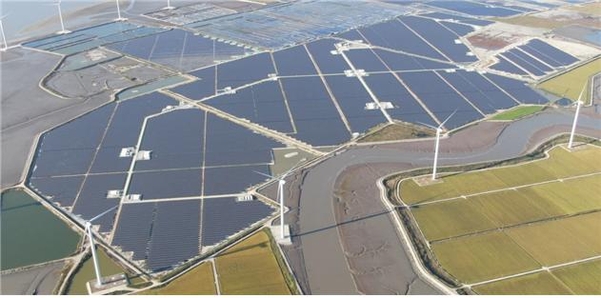Input 2020.12.29 11:36
Enactment of a special law next year to introduce a wind power license integration organization
By 2034, the share of renewable energy generation such as solar and wind power will be increased to 25.8%. To this end, regulations on licensing and licensing are eased, such as the introduction of the wind power one-stop shop, an integrated wind power licensing and licensing organization.
The Ministry of Trade, Industry and Energy announced that it held a new and renewable energy policy council on the 29th and confirmed the 5th basic plan for the development, use and distribution of new and renewable energy technologies. The new and renewable energy basic plan is established every five years and contains mid- to long-term goals and implementation plans in the new and renewable energy field. The 5th plan is scheduled for 2020-2034, which is the same as the 9th Basic Power Supply and Demand Plan, which was recently confirmed.

In this plan, the government proposed policies in the fields of supply, market, demand, industry, and infrastructure, including measures in the supply and market side to expand wind power generation. The first and fourth basic plans for new and renewable energy have not been focused on the quantitative expansion and supply of new and renewable energy.
First of all, it will introduce the’One-Stop Shop’, a wind power license integration organization. To this end, we will promote the enactment of a special law to promote the spread of wind power generation in the middle of next year. In addition, in line with the increase in the life of the facility, the site rental period will be extended from the current 20 to 30 years, and regulations related to permits and permits such as separation distance will be changed.
In addition, a platform that provides information on idle state-owned land suitable for new and renewable energy will be established by next year, and the distribution will be tailored to the location of buildings, industrial complexes, and idle state-owned lands. In addition, it plans to revitalize investment through various financial support using green guarantee and renewable ecosystem funds.
In the market sector, the new and renewable energy supply compulsory system (RPS) market is reorganized, focusing on competitive bidding and long-term contracts to increase the profitability of operators. A plan to expand the current solar market, which is a priority, to other energy sources such as wind power, and to separate the market by energy source will be considered. In addition, based on the time of introduction of the carbon certification system, the bidding system will be reorganized, such as bidding by separating existing and new businesses, and establishing a new market with a large scale (20MW or more).
The RPS duty ratio will be raised to 40% by 2034, and the standard for power generation facilities will be lowered from 500MW to 300MW, increasing the supply obligations from 23 companies to 30 companies next year.
In addition, a plan to introduce a new and renewable heat supply system (RHI or RHO) will be prepared, and a plan to diversify the target of the mandatory renewable fuel mixing (RFS) into renewable energy power or hydrogen in addition to bio fuels will be promoted. The biodiesel blending ratio, which is currently 3%, is planned to be gradually increased to around 5% by 2030.
In terms of demand, it was decided to use a variety of implementation measures to enable companies and public institutions to implement RE100. RE100 is a campaign to cover 100% of the electricity used by companies with renewable energy. To this end, in addition to acknowledging the reduction of greenhouse gases, the company plans to strengthen incentives such as green guarantee support and grant of RE100 labeling, and expand the participants of RE100 to industrial complexes, regions, and citizens (household electricity consumers).
In addition, incentives such as self-consumption type REC (renewable energy supply certificate) will be provided to activate renewable energy for private use. Through this, the plan is to increase the proportion of private solar power facilities, which is 9% in 2019. According to the Ministry of Industry, the proportion of private solar power facilities is 74% in Germany and 40% in the US. Renewable energy that exceeds the demand for each time period is planning to generate demand by discounting weekly rates or using it at other times after storage.
Finally, the government has also established a plan to foster 1,000 hydrogen-specialized companies to revitalize the hydrogen industry, and increase the number of energy innovative companies with sales of more than 100 billion won from the current 9 to 100. To this end, it plans to increase the scale of support for R&D for hydrogen materials, parts, and equipment to 200 billion won by 2030.
In addition, it plans to localize core technologies such as high-efficiency solar cells, ultra-large wind turbines (12MW or more), green hydrogen mass production, and hydrothermal large-capacity heat pumps.
